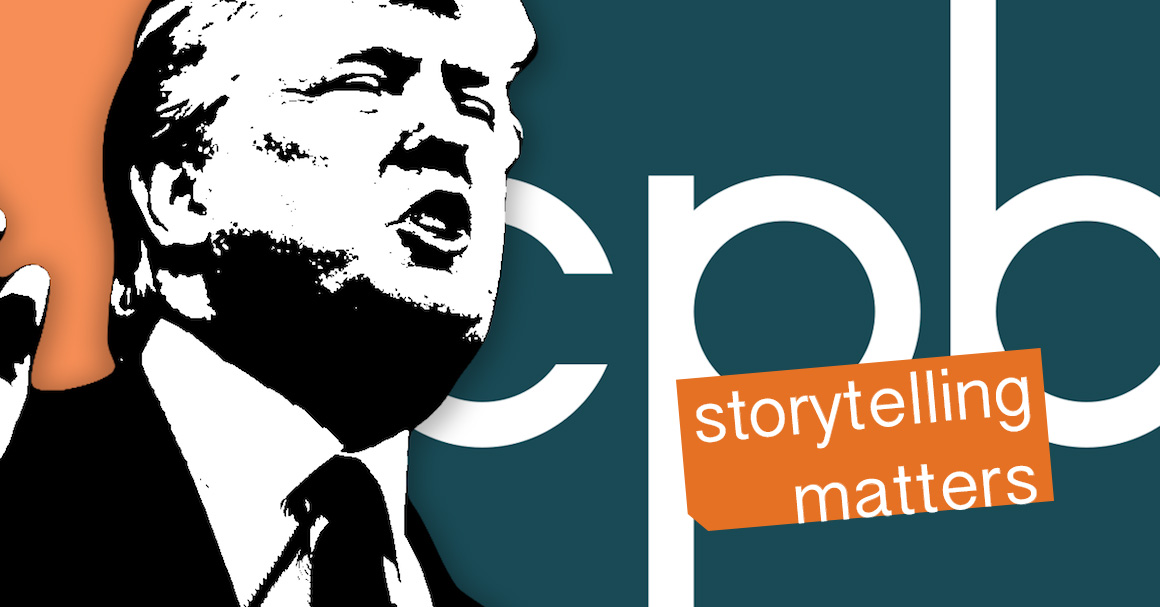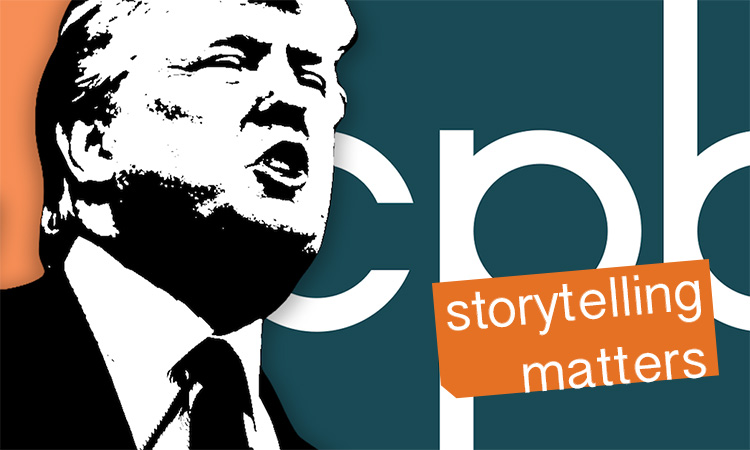
JANUARY 20, 2017 | BY MATT GERTZ
reprinted from Media Matters, mediamatters.org
The Corporation for Public Broadcasting (CPB) is pushing back on reported efforts by the Trump administration to privatize it, saying the proposal would have a “devastating effect” and that “the entire public media service would be severely debilitated.”
CPB is a private nonprofit corporation that receives almost all of its funding from the federal government and distributes those funds as grants to public television and radio stations and their programs. It is the “single largest source of funding for public television and radio programming.”
“Staffers for the Trump transition team have been meeting with career staff at the White House ahead of Friday’s presidential inauguration to outline their plans for shrinking the federal bureaucracy,” The Hill reported this morning. CPB’s annual federal funding of roughly $445 million—a minuscule fraction of the federal budget—is one of the items reportedly on the chopping block.
In a statement to Media Matters responding to the reports, CPB said that “This thinking and proposals like the one being reported in the mainstream media and elsewhere today have been circulating around Washington for years and have been soundly rejected on a bipartisan basis.”
While many think only of National Public Radio (NPR) and the Public Broadcasting Service (PBS) when they think of public media, it actually consists of “a system of independently owned and operated local public radio and television stations” that air a combination of commercial-free original programming and programming licensed from other stations through organizations like NPR and PBS. This programming includes broadcasts on local issues, children’s education, the arts, and public affairs.
[T]here is no substitute for federal support of public broadcasting, and that the loss of federal support would mean the end of public broadcasting, and with it the end of an extraordinarily useful national teaching tool, the loss of the most trusted source of news and public affairs programs in the nation, the erosion of our national memory and exceptional culture, the compromise of our civil defense and emergency alert system, and the demise of a federal investment that the American people consider a better use of tax dollars than any other except national defense. — Booz & Company
The stations derive funding from multiple sources, but that funding is often contingent on the federal grants CPB provides to more than 1,041 radio stations and 365 television stations.
The George W. Bush administration tried to use its authority to swing public programming to the right. Kenneth Y. Tomlinson, Bush’s appointee to chair CPB, used federal funds to examine alleged liberal bias on the PBS program NOW, formerly hosted by Bill Moyers. He also helped raise $5 million to produce a PBS show hosted by The Wall Street Journal’s right-wing editorial board.
But under Obama, congressional Republicans pushed to eliminate funding for public broadcasting altogether. The found a ready cheering section from right-wing media, which frequently lashed out at “liberal” PBS and NPR. Critics typically say that public media should be able to easily make up the loss of the federal dollars.
That’s not the case. According to CPB’s statement, “The federal investment in public media is vital seed money—especially for stations located in rural America, and those serving underserved populations where the appropriation counts for 40-50% of their budget. The loss of this seed money would have a devastating effect.”
Indeed, “the loss of federal support would mean the end of public broadcasting,” according to a 2012 report commissioned by CPB from Booz & Company.
The study reviewed alternative funding mechanisms but determined that none could adequately replace federal funding without compromising the mission of public broadcasting. “A reduction or elimination of CPB funding will put 63% (251) of radio stations and 67% (114) of television stations in the public broadcasting system at risk,” according to the report. Many of the stations at greatest risk for shuttering altogether are in rural areas that have more limited programming options—some are the only broadcast stations available to their audience.
Booz’s report could not have been more explicit about the “inevitable consequences” of cutting off public funding:
This report concludes that there is no substitute for federal support of public broadcasting, and that the loss of federal support would mean the end of public broadcasting, and with it the end of an extraordinarily useful national teaching tool, the loss of the most trusted source of news and public affairs programs in the nation, the erosion of our national memory and exceptional culture, the compromise of our civil defense and emergency alert system, and the demise of a federal investment that the American people consider a better use of tax dollars than any other except national defense.
These are the inevitable consequences of a loss of federal funding for public broadcasting, as this report will demonstrate in detail.
Booz’s conclusions are consistent with a 2007 report from the federal General Accountability Office, which found that “substantial growth of nonfederal support to offset a reduction or elimination of federal support appears unlikely.”
Trump isn’t the first U.S. president to go after federal funding for public media. In 1969, President Nixon called for cutting funding for CPB in half. Thanks to the effort of a young Fred Rogers before a congressional committee, those efforts were defeated. Watch:
You can read CPB’s full statement below:
Public media is a public-private partnership in the best tradition of America’s free enterprise system. It is one of America’s best investments. It is not a large investment compared to most of what government does—just about $1.35 per citizen per year—but it pays huge dividends in education, public safety and civic leadership to millions of Americans and their families.
By statute, the majority of the $445 million federal expenditure goes through the Corporation of Public Broadcasting (CPB), a private, nonprofit corporation, which is the steward of the federal appropriation, to more than 1,500 locally owned and operated public television and radio stations across the country.
From time to time, some argue the Corporation for Public Broadcasting and funding for public media are no longer needed. This thinking and proposals like the one being reported in the mainstream media and elsewhere today have been circulating around Washington for years and have been soundly rejected on a bipartisan basis—most recently by the Republican-controlled House of Representatives in 2015. Further, a national survey of 2,000 self-identified Trump voters confirmed that a majority of those voters support level or increased federal funding for public broadcasting.
The federal investment in public media is vital seed money—especially for stations located in rural America, and those serving underserved populations where the appropriation counts for 40-50% of their budget. The loss of this seed money would have a devastating effect. These stations would have to raise approximately 200 percent more in private donations to replace the federal investment. Moreover, the entire public media service would be severely debilitated. This is because CPB, in addition to direct payment to public media stations, pays for the system’s technical backbone, copyright and other fees, and makes major investments in national content from which all stations and the families they serve benefit. Most critically, public media reaches 68% of all kids age two to eight, providing educational media that’s proven to prepare kids for school, especially low-income and underserved children who do not attend pre-school.
Indeed, the Government Accountability Office (GAO), as well as others, following comprehensive study, have concluded there is no viable private substitute for the federal funding that ensures universal access to public broadcasting’ programming and services.
We look forward to working with the new Administration and the new Congress in the continued pursuit of our public service missions of education, public safety and civic leadership, which the American people overwhelmingly support.


Leave a Reply